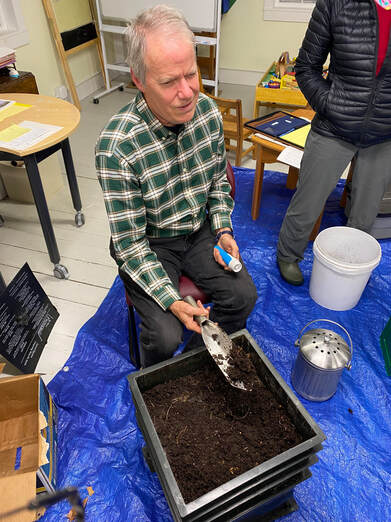|
Dave here reporting on the October presentation: Reed Sims, from Jericho, a retired soil scientist and member of the Composting Association of Vermont, presented a discussion covering the joy, the science, the soil and garden benefits, and the integration of composting into the family routine. There was hands-on participation, recipe guidelines, and mature compost results to touch and smell. Reed discussed compost's role in preparing gardens for overwintering, and what to do if your compost appears to have failed. Reed was joined by 14 people who all had composting experience, but were ready to learn more. He told us that anything organic in nature can be added to a compost pile. And by maintaining the pile by turning it to ensure there is plenty of oxygen for the microbes will enhance the piles ability for making the usable compost earlier. It is important to have both "greens and browns" in your composting mixture. Greens can be composed of grass clippings, fruit peels, coffee grounds and other nitrogen rich structures, and browns can be straw and hay or other woody or paper materials. Do not add meat products to the pile if you have problems with animals and cannot get the pile temperature hot. News paper is great to add to the compost, shredding it into strips is recommended as the microbes like to adhere to the edges of the paper. breaking the paper down faster. You can compost in the winter months keeping in mind that it will freeze, so leave lots of room for your pile to grow during the colder months. If your compost pile starts to smell. it is an indications that it is getting to anaerobic. So with a little effort turning the compost, air will be re introduced to the composting system and the microbes will be able to do a better job with less smell. Indoor composting can take place with the help of the red wiggler worm and worm composter. The worm composter is a multi-level bin that allows the worms to migrate between the levels consuming your composted waste and leaving behind worm castings and compost suitable for using with your plants. The worms also leave behind a liquid called "Worm Tea" that can be used as fertilizer for your plants. It was great to have Reed with us sharing composting techniques with us. Thank you Reed for pulling this presentation together!
Comments are closed.
|
Click to set custom HTML
|

 RSS Feed
RSS Feed
